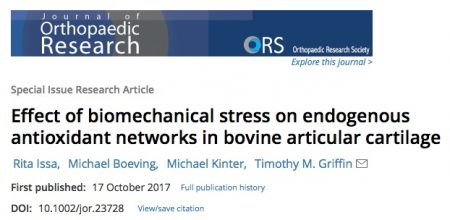[Abstract]
Chondrocytes are mechanosensitve cells that respond to changes in the environment to maintain articular cartilage homeostasis. One potential mechanosensitive feedback system involves enzymes and signaling mechanisms that balance the reducing and oxidizing (i.e., “redox”) conditions of the cell.
We found that cyclic compressive loading of healthy bovine cartilage alters the endogenous cartilage antioxidant network. Higher compressive stress (40% strain) increased glutathione oxidation and caused a reduction in the expression of the rate-limiting enzymes for glutathione synthesis. Higher stress also increased the expression of the mitochondrial antioxidant SOD2 while decreasing the cytosolic isoform SOD1, consistent with mitochondrial-derived ROS production at higher loads. Moderate compressive stress (15% strain) caused glutathione oxidation as well, but it also increased total glutathione content and upregulated SOD1 gene expression. Pro-oxidant conditioning of cartilage using tBHP increased glutathione content without altering any other loading-associated changes. These findings suggest that glutathione synthesis, more than antioxidant enzyme upregulation, is a central pro-oxidant and mechanosensitive mediator of antioxidant defense in chondrocytes.
